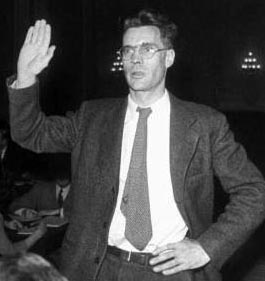Wadleigh, Henry Julian (1904-1994)
An economist in the Trade Agreements Division of the Department of State in the late 1930s who was named by Whittaker Chambers as one of a small group of people who “actually turned over information” to him for Soviet intelligence.
Wadleigh was born into the family of an Episcopal minister in Greenfield, Massachusetts in 1904. Beginning at the age of three, he was mostly educated abroad, receiving his B.C.S. from the London School of Economics and his M.A. from Oxford University in Great Britain. He returned to the United States in 1929 and did one year of graduate work at the University of Chicago. In 1930, Wadleigh began his government service at the Federal Farm Board; in 1933 (or possibly 1932), he transferred to the Department of Agriculture, where he worked chiefly on the foreign trade of agricultural products. In March 1936, Wadleigh transferred to the State Department, where he worked at the Trade Agreements division. After World War II broke out, he was transferred and worked under Leo Pasvolsky, Special Assistant to the Secretary of State, on the problems of postwar economic policy. In 1943, Wadleigh was transferred again, first to the Office of Foreign Economic Coordination, where he worked on economic matters pertaining to the future occupation of Italy, and then to the Foreign Economic Administration (FEA). He moved to the Department of Agriculture at the end of the war and then, in May 1946, to the United Nations Relief and Rehabilitation Administration (UNRRA.) After this entity folded, Wadleigh was hired by the Italian Technical Delegation, where he worked on food programs for Italy. He resigned in early December 1948.
That same month, Wadleigh confessed to the FBI that from early 1936 to March 1938 he had passed State Department documents to two men, one of whom was Chambers. He said that he had been a “leftist,” “an admirer of the British Labor Party,” and “for a while a member of the Socialist Party in the United States,” which he had joined in 1931 or 1932. Wadleigh had never been a member of the Communist Party, but in 1935 he volunteered “to collaborate with the Communist Party,” alarmed by “the failure of the Social Democrats in Germany to offer effective resistance against Hitler, the growing power of the Nazis in Germany [and] of the ruling group in Japan, and the Fascists in Italy.” He explained that he saw “the Communists and Soviet Union” as “offering the only effective opposition.” 1
In 1949, Wadleigh became a government witness in the two Hiss perjury trials, and his story was serialized in 1949 in the New York Post Home News under the title, “Why I Spied for the Communists.”
- Transcripts of Grand Jury Testimony in the Alger Hiss Case. Testimony of Julian Wadleigh, December 11, 1948. ↩


